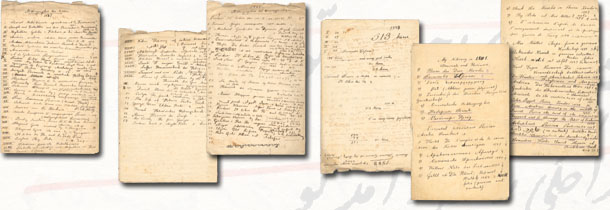In
1927 the readers of the Akadémiai Értesítő (Academic Bulletin) read the
following news in the 1925-26 annual report on the state of the Library:
1
“János Kégl, deceased, in accordance with the last will of his late brother, Prof. and Academician Alexander Kégl, donated the library of the latter to the Academy. This library, collected for several decades in a systematic manner and with great financial sacrifices, includes among others 75 old Oriental, mainly Persian manuscripts. Alexander Kégl, with an universal interest in the Iranian and Semitic Orient, has also collected works in Urdu and Sanskrit, together with the rich literature related to them. Persian literature as well as Arabic and Persian historical literature are also well represented in his collection. Its lexical material is also an important enrichment of our Library. Besides the works related to the East, the collection of European classics is also very valuable.” 2
The Notary of Ráckeve Jenő Reviczky as a representative of János Kégl on 16 September 1924 appealed to the Board of Administration of the Academy to offer, in accordance with the intention of the deceased, the library of his brother Alexander Kégl to the Academy, and to invite them to take the necessary steps in the interest of the delivery of the bequest. 3
Secretary General of the Academy Jenő Balogh’s response illustrates well the universal interests of Alexander Kégl. He declines the legitimate claim of the notary’s as to take an inventory of the bequest not only with reference to the exemption of charges to be expected from the Ministry of Finance, but also by stressing that the inventory “could not be made by only one specialist, as some members of the Academy of Sciences are specialized in the Turkish, Arabic and Persian languages, while others to the Sanskrit, Hindu etc. language group, and to our knowledge the library contains books in all these languages.” 4
The Secretary also immediately signaled to János Kégl that the Academy gratefully accepted the bequest of “extraordinary value”. 5
As the notary insisted 6 that an appointed representative should go to Pusztaszentkirály, and the Academy was willing to invite the Turkologist Gyula Németh, corresponding member of the Academy to revise the library, after long negotiations this took place on 3 June 1925. The final expertise reported on an extremely valuable library: “The value of the Iranian philological section is of inestimable scientific value. It not only embraces the possibly complete European literature on the topic, but also a large number of Eastern publications, manuscripts, several rarities, including many that have important Hungarian relations and are missing from our libraries. As a general characterization of the scientific value of the library, I can say that in several aspects it stands above that of [Arminius] Vámbéry and [Ignaz] Goldziher. Its largest part does not exist in our libraries, and the already excellent Oriental Collection of our Academy will be complemented by it in the most fortunate way.” 7
After receiving the report, and probably also as a response to the already very ill János Kégl, the Academy took quick decisions.
The Board of Administration authorized the Secretary to cover the costs of delivery of the library from the column of “unforeseen expenses” and to arrange for the settlement of the legacy duty. They also entrusted Chief Librarian Zoltán Ferenczi 8 with the control of the delivery, cataloging and other tasks related to the bequest. 9
The official handing over of the library finally took place on 7 August 1925 in Pusztaszentkirály. The protocol was signed on behalf of the Academy by Alajos Jirka. 10 In a letter dated on 15 August the Secretary reported to the notary that the library was already in the palace of the Academy, suggesting that its cataloging would need longer time. 11
The protocol shows that the donation contained 11.108 books, manuscripts (both bound and unbound) and journals. The previous surveys reported about more modest quantities. The initial offering mentioned 3,012 printed books, mostly in deluxe binding, and 2,699 paper-covered volumes. Gyula Németh during his short sojourn of two days estimated the library at 5-7,000 volumes. 12
In terms of size, after the collection of 30 thousand volumes of the library’s founder and the Academy’s first president Count József Teleki, this was the second largest donation in the history of the Library of the Academy. However, its value lies not only in its quantity, for as Gyula Németh wrote, a part of the works was unavailable on the book market, and it contained a large number of precious manuscripts and lithographies purchased in the East. From the letter of János we know that Alexander Kégl already at the beginning of his high school studies had a significant collection of books, and then “during 45 years he invested yearly 5-6 thousand golden forints in the development of his library”.



